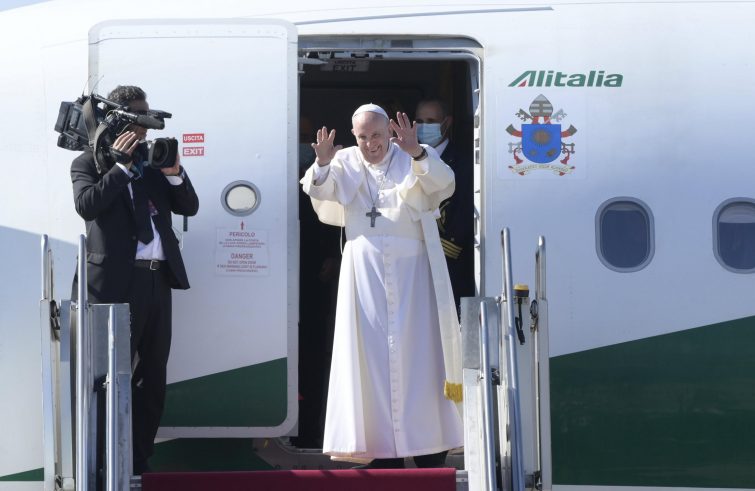
“The motto for the visit is ‘Christ is our future.’ I am not informed about the speeches that the Pope will make in Budapest. The Hungarian Catholic Church is concerned about social and cultural changes, about the decline of traditional religiosity. We are looking forward to a Message for the future. How can we make a new start? How will our future take shape? How can we show that Christ and the faith are the way forward for our country’s future? The key word of this visit is future, and our future is Christ”, said Fr Csaba Törö, parish administrator of Esztergom Cathedral, in charge of the Hungarian Bishops’ Conference’s relations with the media, during an online meeting organised by the Pontifical University of the Holy Cross (ISCOM) regarding the Hungarian people’s expectations for the Holy Father’s apostolic journey to Hungary.
The Holy Father will be arriving in Budapest on April 28, with departure scheduled for April 30. Due to his “physical condition”, it was decided by the Vatican to hold all the events and meetings in the capital city.
With regard to the possibility of Patriarch Kirill’s presence in Budapest, or that of his representative, Father Török remarked that “back in 1996, at the time of Pope John Paul II’s visit to Pannonhalma”, the issue of whether “that visit could provide the opportunity for a meeting with the then Patriarch of Moscow Alexis II was already an open question.” “The Hungarian Catholic Church has consistently strived to serve as a bridge connecting the Orthodox and Roman Catholic Church,” the Hungarian bishops’ spokesman pointed out. “There are open questions even now, due to the current political situation”, although, for now, “these are not on the table.” The priest recalled that the Ecumenical Patriarch, along with representatives of the Orthodox Churches, attended the 2021 International Eucharistic Congress in Budapest.
“Card. Erdö”, he added, “is very fluent in Russian, he has very good relations with the Russian hierarchy, but there is no official knowledge of this.”
Still, the visit will see peace and dialogue as central themes. While in Budapest, the Pope will have formal meetings with the head of state, Prime Minister Viktor Orban and government officialsm as well as representatives of civil society and the diplomatic corps. In this respect, Fr Török pointed out that in 2021, when the Pope travelled to Budapest to attend the International Eucharistic Congress, Prime Minister Victor Orban presented the Holy Father with “a very special gift”, an ancient letter dating back to the Mongol invasion after which more than half the population was annihilated. “The letter written by a Hungarian King of that time, donated to Francis by Victor Orban, asked the then-Pope for help in preserving and saving Christianity in Hungary and in the whole of Europe.
“It was a sign. Victor Orban portrays himself as a defender of Christianity and is intentionally seeking a connection with the Pope.”
The priest remembered that last February, in a budget speech, “Orban said that only two European countries were fighting for peace in Ukraine: the Vatican and Hungary,” for “the Pope is the bearer of peace” and Hungary opposes sending weapons to Ukraine. In essence, what Orban is saying is: “we are the Vatican’s allies and the only country in Europe that protects Christianity, we are doing our utmost for peace in our foreign policy following in the footsteps of the Pope.”
Migration, a thorny issue. “The Catholic Church remains silent,” said the spokesperson, but “many Catholics working in NGOs are doing their best to offer their help.” “Church charitable institutions strive to operate through narrow paths when they fail to gain access to gateways, and in this context the Order of Malta and Caritas have made significant efforts.” Fr Török told journalists about the context Catholics face. “The Hungarian Catholic Church is not independent in terms of funding. Schools, institutes, hospitals, even dioceses are financed by the State. Whenever political tensions arise, whether internal or external, people prefer not to say anything because there is a risk of jeopardizing the inflow of funds. Should a government become an enemy of the Church, it could drive the Church to bankruptcy within a few months.” There is but little room for manoeuvre. “At the bishops’ and bishops’ conference level, the Hungarian Church complies with the government’s directives and tries to adapt to the situation. But when it comes to the Church as a community of believers, numerous steps have been taken to provide a response to this situation according to the Gospel.” The priest recalled the efforts made by Church NGOs and charitable institutions “in the areas along the Serbian border.” “They were of great help to migrants,” he said. “Now Hungary has closed the border, and those entering the country are officially considered illegal migrants. As such they must undergo a judicial process, at the end of which they are sent back to Serbia.”
“Since many routes towards Europe pass through Hungary, there is a large movement of people”, even though the government would rather turn a blind eye. In this regard, many Catholics are reaching out to offer their help “beyond the visible limits of the institutional Church.”











